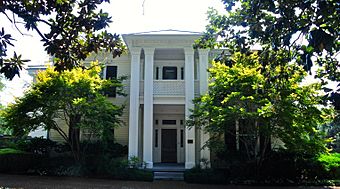Alpheus Truett House facts for kids
Quick facts for kids |
|
|
Alpheus Truett House
|
|

Alpheus Truett House, September 2014.
|
|
| Location | US 31/Franklin Rd. 3/10 mi. N of the Franklin Sq., Franklin, Tennessee |
|---|---|
| Area | 5.2 acres (2.1 ha) |
| Built | c. 1846 and 1864 |
| Architectural style | Greek Revival, Central passage plan |
| MPS | Williamson County MRA |
| NRHP reference No. | 88000364 |
| Added to NRHP | April 13, 1988 |
The Alpheus Truett House is a historic home in Franklin, Tennessee. It was built around 1846. This house is a great example of an "I-house" style building. An I-house is a type of American farmhouse that is usually two stories tall, one room deep, and at least two rooms wide. It also features a "central passage plan," meaning it has a hallway right through the middle of the house.
The house is located at 228 Franklin Road. It was added to the National Register of Historic Places (NRHP) in 1988. This means it's recognized as an important historical place. The property covers about 5.2 acres. It is one of many old homes in Williamson County built between 1830 and 1860. The house faces a historic road that connects Brentwood, Franklin, and Columbia.
Contents
The House During the Civil War
The Alpheus Truett House played a small but interesting role in the American Civil War.
A General's Headquarters
In 1864, during the Battle of Franklin, the house was used by Union Major General John Schofield. He was a leader for the Union army. General Schofield used the house as one of his main headquarters.
Observing the Battle
The Battle of Franklin happened on November 30, 1864. It was one of the most intense battles of the Civil War. General Schofield and his officers went upstairs in the Truett house. From there, they used binoculars to watch the Confederate troops. These soldiers were led by General John Bell Hood. They were attacking the south side of Franklin.
Hidden Money and Reparations
As the battle started, some Union paymasters had a lot of money with them. They quickly hid stacks of cash under flowerpots at the house. Then, they rode off on their horses. After the five-hour battle ended that night, they came back to get their money.
Many years later, in 1915, the Truett family received money from the U.S. government. This payment of $395 was to make up for the use of their home during the war.
Images for kids




